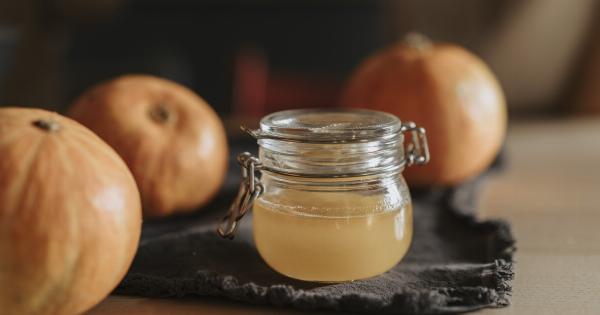When it comes to maintaining good health, a well-balanced diet plays a crucial role. Not only does it provide the necessary nutrients for our body to function optimally, but it also helps prevent various diseases and conditions.
In recent years, there has been a growing interest in finding foods that have anti-cancer properties while benefiting other aspects of health as well. One such food that has garnered attention for its remarkable health benefits is:.
Turmeric: The Golden Spice
Turmeric, also known as Curcuma longa, is a bright yellow spice commonly used in Asian cuisine. It is a key ingredient in curry and has been used for centuries for its medicinal properties.
The active compound responsible for turmeric’s health benefits is called curcumin. Curcumin has been extensively studied for its anti-inflammatory, antioxidant, and anticancer effects.
Lowering Cholesterol Naturally
High cholesterol levels in the blood can increase the risk of heart disease and stroke. Maintaining healthy cholesterol levels is essential for overall cardiovascular health. Research suggests that turmeric may help lower cholesterol levels naturally.
A study published in the Journal of Nutrition and Metabolism found that curcumin supplementation reduced total cholesterol, LDL cholesterol (often referred to as “bad” cholesterol), and triglyceride levels in individuals with metabolic syndrome, a cluster of conditions that increase the risk of heart disease and type 2 diabetes.
Protecting Against Cancer
Cancer is a leading cause of death worldwide, and finding strategies to prevent and treat this devastating disease is of utmost importance. Turmeric has shown promising potential as an anti-cancer agent.
According to a review published in the journal Molecules, curcumin exhibits anti-cancer activities by targeting multiple molecular pathways involved in cancer growth and progression.
It has been found to inhibit the proliferation of cancer cells, induce apoptosis (programmed cell death) in cancer cells, and inhibit the spread of cancer cells to other tissues.
In particular, curcumin has shown potential in preventing and treating colorectal cancer, breast cancer, lung cancer, and prostate cancer.
However, more research is needed to fully understand its mechanisms of action and determine the optimal dosage for different cancer types.
Boosting Brain Health and Preventing Neurodegenerative Diseases
As we age, the risk of neurodegenerative diseases such as Alzheimer’s and Parkinson’s increases. These conditions are characterized by the progressive loss of brain function and can have a significant impact on quality of life.
Fortunately, turmeric may offer protective effects against these diseases.
Studies have shown that curcumin can cross the blood-brain barrier, a protective barrier that helps regulate the movement of substances between the bloodstream and the brain.
Once in the brain, curcumin exerts its beneficial effects by reducing inflammation, clearing protein plaques associated with Alzheimer’s disease, and enhancing brain-derived neurotrophic factor (BDNF), a protein crucial for the growth and survival of neurons.
Moreover, a clinical trial published in the American Journal of Geriatric Psychiatry found that taking curcumin supplements improved the memory and attention abilities of older adults without dementia.
These findings highlight the potential of turmeric as a natural way to support brain health and prevent neurodegenerative diseases.
How to Incorporate Turmeric into Your Diet
Adding turmeric to your diet can be an easy and delicious way to reap its health benefits. Here are some simple ideas to incorporate turmeric into your everyday meals:.
1. Golden Milk:
Golden milk is a warming and soothing beverage that combines turmeric with milk (dairy or plant-based), a dash of black pepper, and other spices like cinnamon or ginger. It is a popular drink in many cultures and can be enjoyed any time of the day.
2. Curries and Stir-Fries:
Turmeric is a staple in curry dishes and stir-fries. Add a teaspoon or two of turmeric powder to your favorite recipe for a vibrant color and a hint of earthy flavor.
3. Smoothies:
Add a pinch of turmeric powder to your morning smoothie for an extra antioxidant boost. It pairs well with fruits like pineapple, mango, or banana.
4. Roasted Vegetables:
Toss your favorite vegetables in a drizzle of olive oil and a sprinkle of turmeric before roasting them in the oven. Not only will it infuse the vegetables with a wonderful flavor, but it will also enhance their nutritional profile.
5. Salad Dressings:
Give your salad dressings a nutritious twist by adding a pinch of turmeric powder. Combine it with olive oil, lemon juice, and your choice of herbs for a simple and healthy dressing.
Conclusion
Turmeric, with its active compound curcumin, has gained recognition as a potent anti-cancer food that also lowers cholesterol and boosts brain health. Its numerous health benefits make it a valuable addition to a well-balanced diet.
From protecting against chronic diseases to supporting brain function, incorporating turmeric into your daily meals can be a tasty and holistic approach to maintaining optimal health.





























